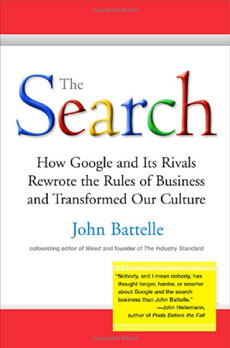Looks like a good month for the blogoclump in the newest issue of Associations Now. Jeff De Cagna has a big spread on what associations can learn from Google via his interview with John Battelle, author of Search: How Google and its Rivals Rewrote the Rules of Business and Transformed our Culture (say that three times fast). I have to admit having seen the book at the airports and not having looked at it because it appears with some copycats and I haven't known which one of them to pick up. Batelle is a techno journalist who speaks quite cogently about issues of 2.0 and the like, and applies them to associations. I agree with the conclusion in the article that Google et al represent more of an opportunity than a threat. But interestingly 2.0 means "that associations need to have good answers for questions that might be asked of search engines." Good point, and not everyone is sensitive to these issues.
And Ben Martin has a page on how he hates the word orientation. He'll send you directions for speed networking if you send him an email.
And Ben Martin has a page on how he hates the word orientation. He'll send you directions for speed networking if you send him an email.
